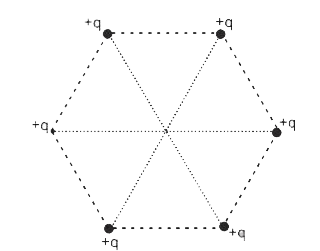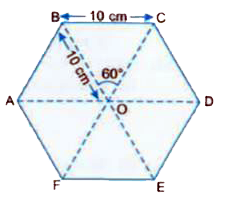A regular hexagon of side a has a charge Q at each vertex. Potential at the centres of hexagon is (k= (14πε0))
Zero
kQa
12kQa
6kQa
The correct Answer is:D
To find the electric potential at the center of a regular hexagon with a charge Q at each vertex, we can follow these steps:
Step 1: Understand the Geometry
A regular hexagon has six vertices, and each vertex has a charge Q. The distance from each vertex to the center of the hexagon is the same due to its symmetry. Let's denote this distance as r.
Step 2: Calculate the Distance from Vertex to Center
For a regular hexagon with side length a, the distance from any vertex to the center can be calculated using the formula:
r=a√3(for a regular hexagon)
However, for the potential calculation, we can just use the side length a directly since the potential depends on the distance from the charge to the point where the potential is being calculated.
Step 3: Write the Formula for Electric Potential
The electric potential V due to a single point charge Q at a distance r is given by:
V=kQr
where k=14πϵ0.
Step 4: Calculate the Total Potential at the Center
Since the potential is a scalar quantity, we can simply add the potentials due to each charge at the center. There are six charges, so the total potential Vtotal at the center is:
Vtotal=6⋅kQr
Substituting r=a:
Vtotal=6⋅kQa
Step 5: Final Expression for Potential
Thus, the potential at the center of the hexagon is:
V=6kQa
Conclusion
The potential at the center of the hexagon with a charge Q at each vertex is:
V=6kQa
A regular hexagon has six vertices, and each vertex has a charge Q. The distance from each vertex to the center of the hexagon is the same due to its symmetry. Let's denote this distance as r.
For a regular hexagon with side length a, the distance from any vertex to the center can be calculated using the formula:
r=a√3(for a regular hexagon)
However, for the potential calculation, we can just use the side length a directly since the potential depends on the distance from the charge to the point where the potential is being calculated.
The electric potential V due to a single point charge Q at a distance r is given by:
V=kQr
where k=14πϵ0.
Since the potential is a scalar quantity, we can simply add the potentials due to each charge at the center. There are six charges, so the total potential Vtotal at the center is:
Vtotal=6⋅kQr
Substituting r=a:
Vtotal=6⋅kQa
Thus, the potential at the center of the hexagon is:
V=6kQa
The potential at the center of the hexagon with a charge Q at each vertex is:
V=6kQa
Topper's Solved these Questions
Similar Questions
Knowledge Check
A hexagon of side 8 cm has a charge 4μC at each of its vertices. The potential at the centre of the hexagon is
A2.7×106VB7.2×1011VC2.5×1012VD3.4×104VA hexagon of side 'a' has a charge 'q' at each of its vertices. The electric field at the centre of hexagon is
A0B14π∈0.qa2C14π∈0.6qa2D14π∈0.6q2a2Area of regular hexagon with side 'a' is
A3√34a2 sq. unitB122√3a2 sq. unitC92√3a2 sq. unitD6√2a2 sq. unit
A regular hexagon of side 10 cm has a charge 5μC at each of its vertices. Calculate the potential at the center of the hexagon.
View SolutionSix equal point charges are placed at the corners of a regular hexagon of side 'a'. Calculate electric field intensity at the centre of hexagon ?

View SolutionA wire shaped to a regular hexagon of side 2cm carries a current of 2A. Find the magnetic field at the cetre of the hexagon.
View SolutionArea of a regular hexagon with side ‘a’ is
View SolutionA wire shaped to a regular hexagon of side x carries a current I ampere. Calculate the strength of the magnetic field at the centre of the hexagon.
View Solution

